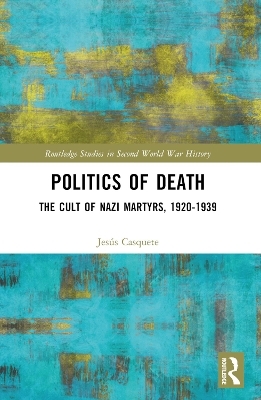
Politics of Death
The Cult of Nazi Martyrs, 1920-1939
Seiten
2024
Routledge (Verlag)
978-1-032-41367-9 (ISBN)
Routledge (Verlag)
978-1-032-41367-9 (ISBN)
- Lieferbar (Termin unbekannt)
- Versandkostenfrei
- Auch auf Rechnung
- Artikel merken
To disentangle the National Socialists’ path to power in Germany, one must attend to the discursive strategies and liturgical practices employed by its emocrats, or manipulators of emotions. The apotheosis of martyrdom in the National Socialist propaganda template is far from being a marginal element in the movement’s history. Owing to its mobilising and unifying potential in constructing a community of memory, the glorification of Nazi martyrdom constituted a fundamental pillar of the movement’s communicative and propaganda strategy, stressed to the point of paroxysm.
The propaganda and lies that ground the construction of the martyr as a prefiguration of the "new man" are the core ideas that form the backbone of this book. The Nazis’ politics of death was a carefully managed element of National Socialism from its very inception. The martyrs, and their blood sacrificed on the altar of the fatherland, were an invaluable propaganda weapon.
There were three pillars of the Nazi martyrdom frame: sublimation of death, posthumous sugar-coating and "tamed" death. Once the Nazi movement had taken control of German state apparatus, the mechanisms for disseminating the exemplary martyr in society may have changed, but not the specifics of the propaganda strategy itself.
The propaganda and lies that ground the construction of the martyr as a prefiguration of the "new man" are the core ideas that form the backbone of this book. The Nazis’ politics of death was a carefully managed element of National Socialism from its very inception. The martyrs, and their blood sacrificed on the altar of the fatherland, were an invaluable propaganda weapon.
There were three pillars of the Nazi martyrdom frame: sublimation of death, posthumous sugar-coating and "tamed" death. Once the Nazi movement had taken control of German state apparatus, the mechanisms for disseminating the exemplary martyr in society may have changed, but not the specifics of the propaganda strategy itself.
Jesús Casquete is Professor of History of Political Thought at the University of the Basque Country, Spain, and fellow at the Center for Research on Antisemitism (ZfA) in Berlin. His fields of research include social movements, political violence and twentieth-century German history.
1. Totalitarianism and the new man 2. “A healthy fist and love for the fatherland in the heart”: Nazi stormtroopers 3. The Nazi Martyrdom Frame 4. Conclusion
| Erscheinungsdatum | 17.05.2023 |
|---|---|
| Reihe/Serie | Routledge Studies in Second World War History |
| Verlagsort | London |
| Sprache | englisch |
| Maße | 156 x 234 mm |
| Gewicht | 453 g |
| Themenwelt | Geschichte ► Allgemeine Geschichte ► 1918 bis 1945 |
| Geisteswissenschaften ► Geschichte ► Regional- / Ländergeschichte | |
| Geschichte ► Teilgebiete der Geschichte ► Militärgeschichte | |
| Sozialwissenschaften ► Politik / Verwaltung ► Politische Systeme | |
| Sozialwissenschaften ► Politik / Verwaltung ► Politische Theorie | |
| ISBN-10 | 1-032-41367-0 / 1032413670 |
| ISBN-13 | 978-1-032-41367-9 / 9781032413679 |
| Zustand | Neuware |
| Haben Sie eine Frage zum Produkt? |
Mehr entdecken
aus dem Bereich
aus dem Bereich
ein Psychologe erlebt das Konzentrationslager
Buch | Hardcover (2024)
Kösel (Verlag)
CHF 30,80
Mythos „Stauffenberg-Attentat“ – wie der 20. Juli 1944 verklärt und …
Buch | Hardcover (2024)
Goldmann (Verlag)
CHF 33,55
die letzte Woche des Dritten Reiches
Buch | Softcover (2023)
C.H.Beck (Verlag)
CHF 22,40


